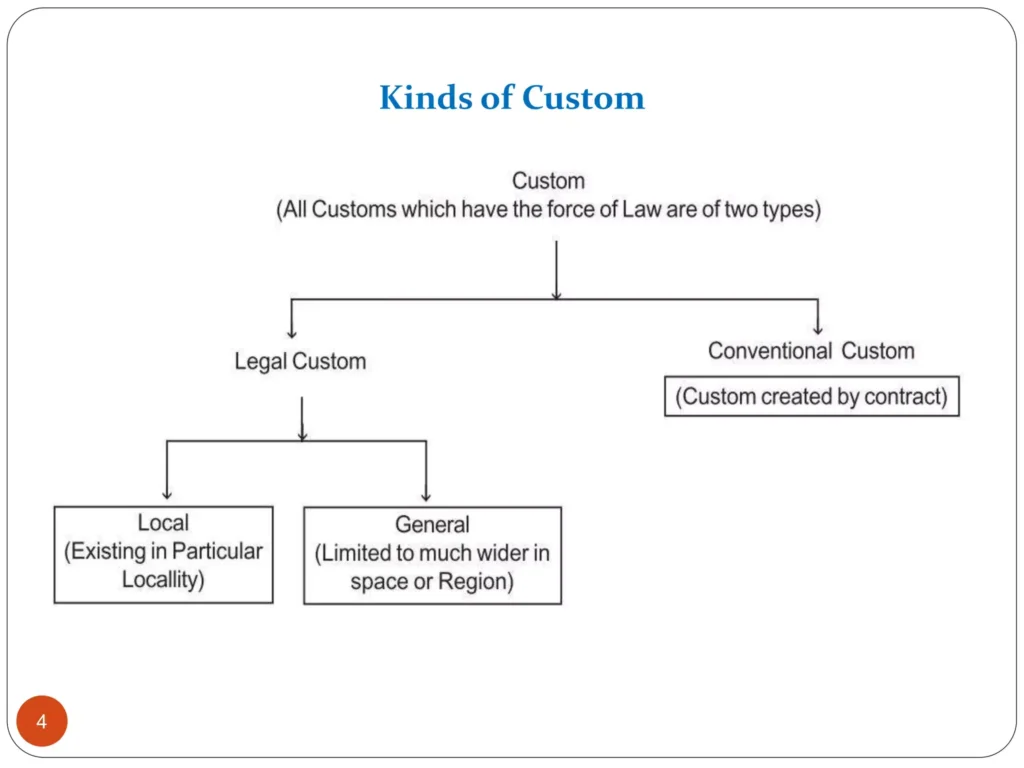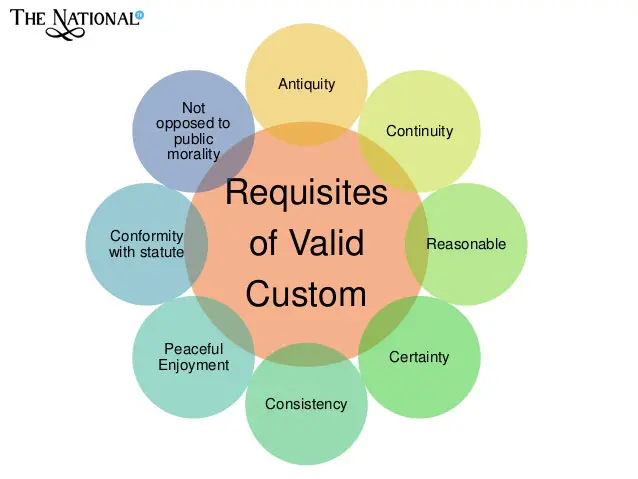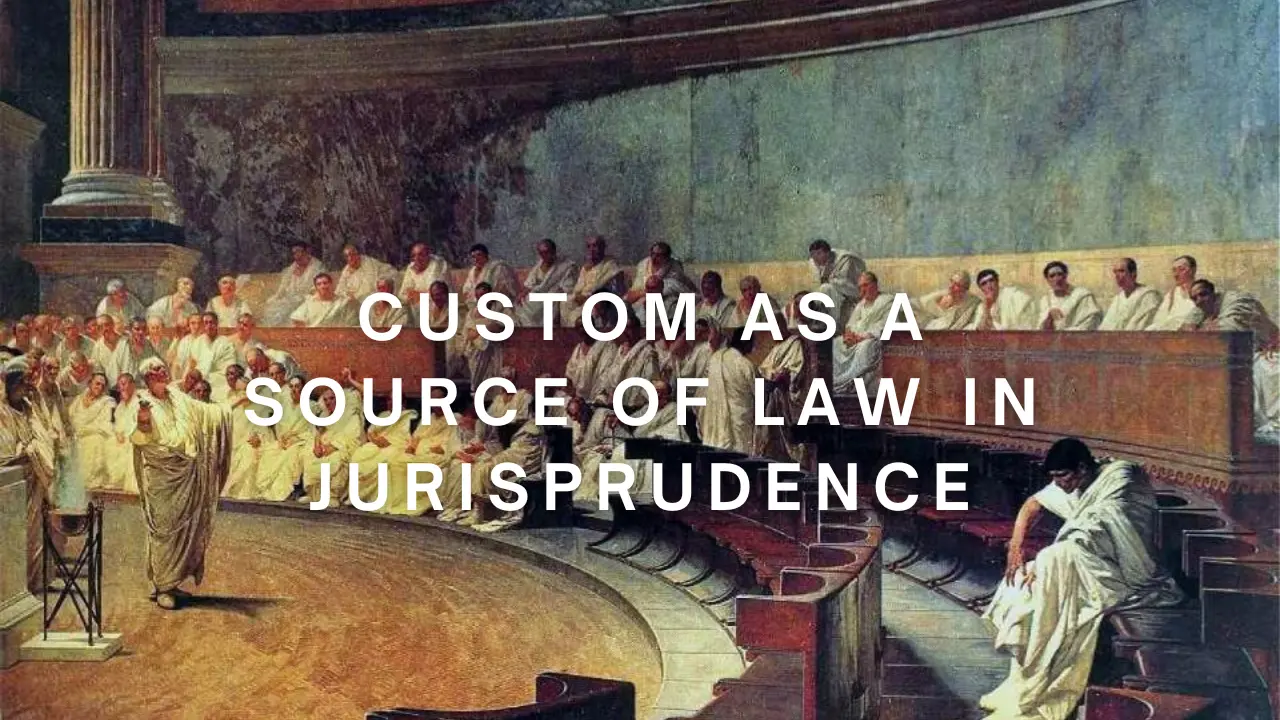Introduction
In law, custom represents those long-established practices or unwritten rules that have gained a binding or obligatory character over time. In ancient societies, custom held a prominent place as one of the most significant sources of law, often considered the real foundation of legal systems. However, as modern civilization evolved, the importance of custom as a source of law diminished, giving way to judicial precedents and legislation.
Custom as a Valid Source of Law
Despite its reduced prominence, the custom remains an important source of law. There are two prevailing views regarding the status of custom as law. Jurists like Austin oppose the notion of custom as law, arguing that it does not originate from the sovereign’s will. Conversely, jurists such as Savigny view custom as the primary source of law. According to Savigny, the true source of law lies in the will of the people, which manifests through the customs and traditions of society. Therefore, custom serves as a main source of law.
Also Read: Sociological School Of Jurisprudence
The Historical Background of Custom
Various perspectives exist on custom as a source of law. The historical school of jurisprudence suggests that law is a product of natural forces linked to the spirit of each person. Nothing represents these evolutionary processes better than the autonomous customs found in every community, as intrinsic as its flora or fauna. Custom justifies itself because its existence reflects a deep-seated need or quality of the people.
Types of Customs

Customs can be broadly categorized into two classes:
Customs Without Sanction
These customs are non-obligatory and followed due to public opinion rather than legal enforcement.
Customs With Sanction
These customs are binding and enforced by the state, further divided into:
Legal Custom
Legal customs possess the force of law, recognized and enforced by courts. They can be:
- General Customs: Prevalent throughout the state’s territory.
- Local Customs: Applicable to specific regions within the state.
Conventional Customs
Conventional customs bind parties to an agreement, assuming they adhere to established trade conventions or usages. For example, a rental agreement between a landlord and tenant would follow customary rent payment practices.
Essentials of a Valid Custom

Not all customs qualify as sources of law. Courts and jurists have established essential criteria for recognizing valid customs:
Antiquity
A valid custom must have existed for a long time, often beyond human memory. In England, the year 1189, during King Richard I’s reign, serves as a benchmark for determining the validity of customs.
Continuity
A custom must be continuously practised without interruption. Long gaps or disrupted practices raise doubts about its validity.
Exercised as a Matter of Right
A valid custom must be openly practised with community knowledge, not secretly. It should be established as a matter of right, not just a doubtful exercise.
Reasonableness
A valid custom should align with norms of justice and public utility. It must be rational and reasonable, not causing more harm than good.
Morality
Customs must not be immoral or against public policy. Courts have invalidated customs practised for immoral purposes or opposing public policy.
Conformity with Legislation
In modern states, new legislation generally takes precedence over custom. Therefore, a valid custom must not contradict existing laws. For instance, laws have abolished practices like child marriage, declaring them offences.
Conclusion
While modern legal systems prioritize legislation and judicial precedents, custom remains a significant source of law, reflecting the will and traditions of the people. Understanding the essentials of a valid custom helps in recognizing its role in shaping legal principles and ensuring justice within a society.
FAQs
1. What is a legal custom?
A legal custom is a type of custom that possesses the force of law and is recognized and enforced by courts. It is binding on the community and can be classified into general customs, which are prevalent throughout a state, and local customs, which apply to specific regions.
2. How do conventional customs differ from legal customs?
Conventional customs are binding on parties to an agreement based on established trade conventions or usages. They differ from legal customs in that they are not enforced by the state but by mutual understanding and practices within specific trades or agreements.
3. What are the essential criteria for a custom to be considered a valid source of law?
For a custom to be a valid source of law, it must meet several criteria: antiquity (existence beyond human memory), continuity (uninterrupted practice), exercised as a matter of right (openly practised and recognized by the community), reasonableness (aligned with norms of justice and public utility), morality (not immoral or against public policy), and conformity with existing legislation (not contradicting current laws).
Also Read: Sources Of Law | Meaning and Types
Reference: legalserviceindia.com
